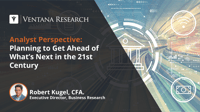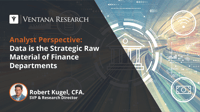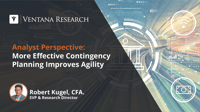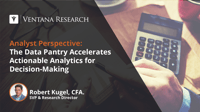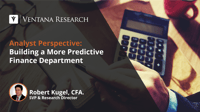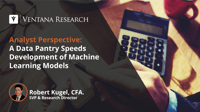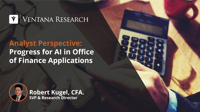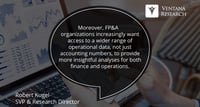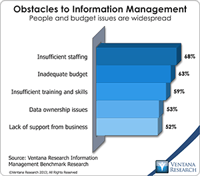We live in an era of uncertainty, not unpredictability. Managing in uncertain times is always difficult, but tools are available to improve the odds for success by making it easier and faster to plan for contingencies and scenarios. Software makes it possible to manage ahead of any future event, connecting the tactical trees to the strategic forest. The purpose of planning is not just to create a plan: Enterprises spend time thinking ahead because it enables leadership teams, executives and...
Read More
Topics:
Office of Finance,
Continuous Planning,
Data Management,
Business Planning,
data operations,
digital finance,
AI and Machine Learning
The Office of Finance can be compared to a numbers factory where the main raw material, data, is transformed into financial statements, management accounting, analyses, forecasts, budgets, regulatory filings, tax returns and all kinds of reports. Data is the strategic raw material of the finance and accounting department. It is the key ingredient in every sale and purchase as well as every transaction of any description. Quality control is essential to achieving high standards of output in any...
Read More
Topics:
Office of Finance,
embedded analytics,
Analytics,
Business Intelligence,
Data Management,
Business Planning,
ERP and Continuous Accounting,
data operations,
digital finance,
AI & Machine Learning,
operational data platforms,
Analytic Data Platforms,
Revenue, Lease and Tax Accounting,
Purchasing/Sourcing/Payments,
Consolidate/Close/Report
We live in a time of uncertainty, not unpredictability. Managing an organization in uncertain times is always hard, but tools are available to improve the odds for success by making it easier and faster to plan for contingencies and scenarios. Software makes it possible to quickly consider the impact of a range of events or assumptions and devise a set of plans to deal with them. Dedicated planning and budgeting software has been around for decades but is about to become all the more useful as...
Read More
Topics:
Office of Finance,
Data Management,
Business Planning,
digital finance,
AI & Machine Learning
Ventana Research uses the term “data pantry” to describe a method of data storage (and the technology and process blueprint for its construction) created for a specific set of users and use cases in business-focused software. It’s a pantry because all the data one needs is readily available and easily accessible, with labels that are immediately recognized and understood by the users of the application. In tech speak, this means the semantic layer is optimized for the intended audience. It is...
Read More
Topics:
Continuous Planning,
Business Intelligence,
Data Management,
Business Planning,
Data,
Financial Performance Management,
Enterprise Resource Planning,
continuous supply chain,
data operations,
digital finance,
AI & Machine Learning,
profitability management,
Analytics & Data,
Streaming Data & Events
A predictive finance department is one that can command technology to be more forward-looking and action-oriented while still fulfilling its core role of handling the financial elements of its organization including accounting, treasury and corporate finance. Beyond just automating rote tasks, technology also facilitates a shift toward becoming a predictive finance organization. Greater amounts of information, now available in near real time, and the increasing use of artificial intelligence...
Read More
Topics:
Office of Finance,
business intelligence,
Data Management,
Business Planning,
Financial Performance Management,
ERP and Continuous Accounting,
digital finance,
AI & Machine Learning
A few years ago – somewhat tongue in cheek – I began using the term “data pantry” to describe a type of data store that’s part of a business application platform, created for a specific set of users and use cases. It’s a data pantry because, unlike a general-purpose data store such as a data warehouse, everything the user needs is readily available and easily accessible, with labels that are immediately recognized and understood.
Read More
Topics:
Data Management,
Business Planning,
Financial Performance Management,
ERP and Continuous Accounting,
digital finance,
AI & Machine Learning
The use of artificial intelligence (AI) using machine learning (ML) will be the single most important trend in business software this decade because it can multiply the investment value of such applications and provide vendors an important source of differentiation to achieve a competitive advantage in what are today very mature software categories. I assert that by 2025, almost all Office of Finance software vendors will have incorporated some AI capabilities to reduce workloads and improve...
Read More
Topics:
Office of Finance,
embedded analytics,
Data Management,
Business Planning,
Financial Performance Management,
ERP and Continuous Accounting,
digital finance,
AI & Machine Learning
The use of blockchain distributed ledgers in business processes is now a common theme in many business software vendors’ presentations. The technology has a multitude of potential uses. However, presentations about the opportunities for digital transformation always leave me wondering: How is this magic going to happen? I wonder this because the details about how data flows from point A to point B via a blockchain are critically important to blockchain utility and therefore the pace of its...
Read More
Topics:
Planning,
Predictive Analytics,
Forecast,
FP&A,
Machine Learning,
Reporting,
budget,
Budgeting,
Continuous Planning,
Analytics,
Data Management,
Cognitive Computing,
Integrated Business Planning,
AI,
forecasting,
consolidating
Ventana Research uses the term “predictive finance” to describe a forward-looking, action-oriented finance organization that places emphasis on advising its company rather than fulfilling the traditional roles of a transactions processor and reporter. Technology is driving the shift away from the traditional bean-counting role. The cumulative evolution of software advances will substantially reduce finance and accounting workloads by automating most of the mechanical, rote functions in...
Read More
Topics:
Planning,
Predictive Analytics,
Forecast,
FP&A,
Machine Learning,
Reporting,
budget,
Budgeting,
Continuous Planning,
Analytics,
Data Management,
Cognitive Computing,
Integrated Business Planning,
AI,
forecasting,
consolidating
When applying information technology to drive better business performance, companies and the systems integrators that assist them often underestimate the importance of organizing data management around processes. For example, companies that do not execute their quote-to-cash cycle as an end-to-end process often experience a related set of issues in their sales, marketing, operations, accounting and finance functions that stem from entering the same data into multiple systems. The inability to...
Read More
Topics:
Big Data,
Mobile,
ERP,
Office of Finance,
Operational Performance Management (OPM),
Operations,
Management,
close,
closing,
computing,
end-to-end,
Analytics,
Cloud Computing,
Data Management,
Business Performance Management (BPM),
CRM,
Data,
finance,
Information Applications (IA),
Information Management (IM),
Sales Performance Management (SPM),
Supply Chain Performance Management (SCPM),
FPM
